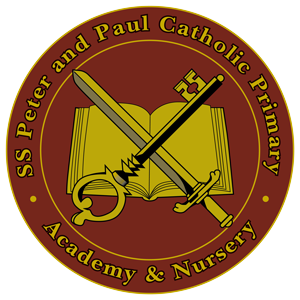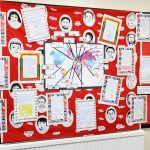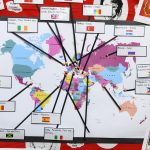Intent
Within SS Peter and Paul, we believe that studying a language in primary school provides children with skills that are essential for modern life. As well as giving children the opportunity to learn a new language (an increasingly important skill in our globalised society), it also helps to promote and develop a broader intercultural understanding.
At SS Peter and Paul, we teach French and we hope by studying this language, children will be exposed to the wonders of French culture and its position in the world. We use Kapow Primary’s French scheme of work to support our teaching delivery because this scheme supports our aims to instil a love of language learning and an awareness of other cultures. We want pupils to develop the confidence to communicate in French for practical purposes, using both written and spoken French. Through this scheme of work and our teaching, we aim to give pupils a foundation for language learning that encourages and enables them to apply their skills further. This can be achieved to allow our children to learn additional languages, develop a stronger understanding of the English language, facilitate future study and open up opportunities to study and work in other countries in the future.
Implementation
SS Peter and Paul Catholic Primary Academy has a dedicated MFL leader with responsibility to ensure there is coverage and progression in the teaching of French across Years 3 to 6. The Kapow French scheme of work is designed with six strands that run throughout. These are:
- Speaking and pronunciation
- Listening
- Reading and writing
- Grammar
- Intercultural understanding
- Language detective skills
Our Progression of skills document shows the skills that are taught within each year group and how these skills develop to ensure that attainment targets are securely met by the end of Key Stage 2.
Through Kapow Primary’s French scheme, pupils are given opportunities to communicate for practical purposes around familiar subjects and routines, as well as topics that will interest them personally. Our curriculum plan provides balanced opportunities for communication in both spoken and written French. This begins in Year 3 where we prioritise developing the children’s speaking and listening skills, which are essential when learning a new language, before incorporating written French in Year 4 and beyond.
Our curriculum offer for French is a spiral curriculum, with key skills and vocabulary revisited repeatedly with increasing complexity, allowing pupils to reactivate and build on their prior learning. This helps the knowledge to become embedded in the child’s long term memory. Cross-curricular links are included throughout our French units, allowing children to make connections and apply their language skills to other areas of their learning.
Impact
Our children will continuously build on their previous knowledge as they progress in their foreign language learning journey through the primary phase. Previous language will be reactivated, and consolidated whenever possible and appropriate.
Children will leave SS Peter and Paul equipped with a range of language-learning skills to enable them to study French, or any other language with confidence at Key Stage 3.
The expected impact of following the Kapow Primary French scheme of work is that children will:
- Be able to engage in purposeful dialogue in practical situations (e.g., ordering in a cafe, following directions) and express an opinion.
- Make increasingly accurate attempts to read unfamiliar words, phrases, and short texts.
- Speak and read aloud with confidence and accuracy in pronunciation.
- Demonstrate understanding of spoken language by listening and responding appropriately.
- Use a bilingual dictionary to support their language learning.
- Be able to identify word classes in a sentence and apply grammatical rules they have learnt.
- Have developed an awareness of cognates and near-cognates and be able to use them to tackle unfamiliar words in French, English, and other languages.
- Be able to construct short texts on familiar topics.
- Meet the end of Key Stage 2 stage expectations outlined in the National curriculum for languages.




